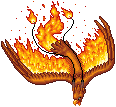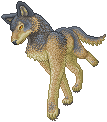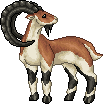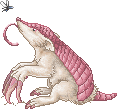Let's Pretend We're Gods
Moderator: Tea House Moderators
-
Mintlynx

- Creatures • Trade
- Posts: 2
- Joined: February 27th, 2018, 10:46:24 am
- Location: Somewhere up north...
Re: Let's Pretend We're Gods
Chouhiko, God of the home and of travel.
In contrast to their affinity with homes and community, Chouhiko is also often described as a self-sufficent nomad god who would travel the earth every few centuries. A tale passed between gods say that Chouhiko wields fire to punish greed and selfishness because of something that happened to him very long ago. This god is very often associated with the phrase, "Your home is where your heart is."
Chouhiko's represented as a cat, of varying breeds, (mostly breeds local to where he is depicted) his most common being a black cat.
In Chouhikos earthly lore they are often described possessing spells of physical and spiritual healing. It is true that he brings prosper to kind people he encounters, giving them gold, beauty, and health.
Chouhiko is pretty widespread, since he is worshipped by most travellers and often many housewives and homeless.
He is depicted in scrolls, at times on urns and vases, and on shrines as a resting cat to pray to along with many other gods for good fortune.
Jouhe, both god and goddess of...
In contrast to their affinity with homes and community, Chouhiko is also often described as a self-sufficent nomad god who would travel the earth every few centuries. A tale passed between gods say that Chouhiko wields fire to punish greed and selfishness because of something that happened to him very long ago. This god is very often associated with the phrase, "Your home is where your heart is."
Chouhiko's represented as a cat, of varying breeds, (mostly breeds local to where he is depicted) his most common being a black cat.
In Chouhikos earthly lore they are often described possessing spells of physical and spiritual healing. It is true that he brings prosper to kind people he encounters, giving them gold, beauty, and health.
Chouhiko is pretty widespread, since he is worshipped by most travellers and often many housewives and homeless.
He is depicted in scrolls, at times on urns and vases, and on shrines as a resting cat to pray to along with many other gods for good fortune.
Jouhe, both god and goddess of...
-
Psixi
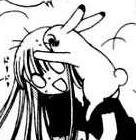
- Creatures • Trade
- Posts: 78
- Joined: March 6th, 2013, 9:48:19 am
- Gender: Female
- Location: A tree in Thunderclan, trying to get internet connection.
Re: Let's Pretend We're Gods
Jouhe, both God and Goddess of Winter and Damnation.
It comes with a pale knocking,
Unbidden from the dark night
Often known as the Faceless One, the terrifying figure of Jouhe usually adorns temple walls, for its visage is only ever carved into stone. This deity is winter itself, and it is said that the other gods gave it birth so that it would become the overseer of hell. Yet after months passed, even the damned could not abide the cold creature and fought back in desperation to drive it out, so that Jouhe was forced to abandon the afterlife and wander above ground, to the land of the living. The gods saw this, and understood that something must be done, so they finally allowed thus: for nine months of the year, the damned would suffer Jouhe's presence, but for the last three months, Jouhe would leave the underworld and wander above ground.
Thus, Jouhe is feared as the cold deity of damnation and the breath of death, and is most often represented as a silent, frozen corpse in a long, black cowl, from which only a white and featureless face is visible. It has no eyes, no nose and no mouth, merely scar tissue disfigured with hoarfrost.
Yet the Faceless One, despite how feared a figure it is, is never shown as deliberately malicious. To meet it is death, but a merciful one. During the months when it ventures to the earth, the wicked dead are said to rejoice and rest, and many of them repent from their evil by way of the Faceless One's chilled touch.
Jouhe is called upon by those who wish to complete penance or who need to right a wrong. Judges and those passing judgement invoke Winter and Damnation, to change the hearts of those whom they punish. Mothers and elders commonly call on Jouhe to bring their disobedient children to heel, whereas criminals and thieves never truly forget the deity, many of them preparing burnt offerings in winter, to greet the being that will take them after death.
Anittu, God of
It comes with a pale knocking,
Unbidden from the dark night
Often known as the Faceless One, the terrifying figure of Jouhe usually adorns temple walls, for its visage is only ever carved into stone. This deity is winter itself, and it is said that the other gods gave it birth so that it would become the overseer of hell. Yet after months passed, even the damned could not abide the cold creature and fought back in desperation to drive it out, so that Jouhe was forced to abandon the afterlife and wander above ground, to the land of the living. The gods saw this, and understood that something must be done, so they finally allowed thus: for nine months of the year, the damned would suffer Jouhe's presence, but for the last three months, Jouhe would leave the underworld and wander above ground.
Thus, Jouhe is feared as the cold deity of damnation and the breath of death, and is most often represented as a silent, frozen corpse in a long, black cowl, from which only a white and featureless face is visible. It has no eyes, no nose and no mouth, merely scar tissue disfigured with hoarfrost.
Yet the Faceless One, despite how feared a figure it is, is never shown as deliberately malicious. To meet it is death, but a merciful one. During the months when it ventures to the earth, the wicked dead are said to rejoice and rest, and many of them repent from their evil by way of the Faceless One's chilled touch.
Jouhe is called upon by those who wish to complete penance or who need to right a wrong. Judges and those passing judgement invoke Winter and Damnation, to change the hearts of those whom they punish. Mothers and elders commonly call on Jouhe to bring their disobedient children to heel, whereas criminals and thieves never truly forget the deity, many of them preparing burnt offerings in winter, to greet the being that will take them after death.
Anittu, God of
Re: Let's Pretend We're Gods
Anittu, God of
Disabilities and the disabled weather it be mental or physical. They are depicted as two foxes Ani and Tu. Ani has no eyes and Tu is seemingly whole, but his mind was badly injured when he was young. They support each in all the myths and are never seen very far apart so they are given the single name of Anittu. They rely so heavily on each other because the earth spat them out of her body like she didnt even want them. When given an offering, Anittu will ease pain and guide the blind. Offerings include willow bark, one rabbit, any healing herbs, and an act of service to those who are injured or hurt. Followers for Anittu often keep their doors open so that the sick and disabled may come and be healed.They are practiced in healing and medicine.
Lawte non bianary god of......
Disabilities and the disabled weather it be mental or physical. They are depicted as two foxes Ani and Tu. Ani has no eyes and Tu is seemingly whole, but his mind was badly injured when he was young. They support each in all the myths and are never seen very far apart so they are given the single name of Anittu. They rely so heavily on each other because the earth spat them out of her body like she didnt even want them. When given an offering, Anittu will ease pain and guide the blind. Offerings include willow bark, one rabbit, any healing herbs, and an act of service to those who are injured or hurt. Followers for Anittu often keep their doors open so that the sick and disabled may come and be healed.They are practiced in healing and medicine.
Lawte non bianary god of......
Re: Let's Pretend We're Gods
Lawte, non-binary god of identity and consciousness. Lawte is believed to be a god who implants and enables consciousness across living beings on earth. Every person's consciousness is a small piece of them, scattered across all creatures on Earth. The larger the fragment, the more advanced the creature. Lawte is often depicted as a mainly humanoid creature with ten arms, each belonging to a different animal, antennas and wings. When given an offering, this god may increase the size of your consciousness fragment piece by a little bit, sending you just a little closer to enlightenment. Their symbols include a piece of shattered glass, a spiral of ten animal features or a rotating spiral with the very centre being a square shape. They are widely worshipped by most.
Reordan, god of...
Reordan, god of...
-
dinsfire24
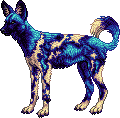
- Creatures • Trade
- Posts: 34
- Joined: April 7th, 2018, 10:27:57 pm
- Gender: Female
- Location: having a headache
Re: Let's Pretend We're Gods
Reordan, god of writing and language. Reordan is thought to be backing anyone with proper writing and a knowledge of their language. This god is believed to have help a small amount in any decent piece of literature, be it digital or traditional. It is said that if Reordan curses you, you will forever have terrible writing skills. He is often depicted as a young adult man with a pen in one hand and a scroll in the other. If he is given an offering, he will gift you with better writing skills. Offerings generally include ink, scrolls or paper, pens, pencils, and food. He is somewhere in between major and minor in his religion and generally worshipped by writers.
Prismae, Goddess of...
Prismae, Goddess of...
Re: Let's Pretend We're Gods
Prismae goddess of the rainbow, she was born after the first rain along with all of the seeds and trees and plants. She has many forms, the rainbow, of course, also a young woman with butterfly wings and skin like mother of pearl. Refugees and pilgrims often worship her as she represents hope after turmoil. They give to her all. She accepts every sacrifice given from the heart, but, if given to show off, there are stories of years of bad luck because someone got on the wrong side of the goddess of hope.
Gesa god of..
Gesa god of..
-
Lanhua
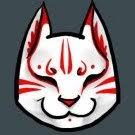


- Creatures • Trade
- Posts: 21
- Joined: March 17th, 2018, 10:35:44 am
- Gender: Literally just six cats of varying gender identities sharing a suit of human skin
Re: Let's Pretend We're Gods
Gesa the god of war
Gesa is a handsome courageous warrior who is overflowing herioc aura. He is agile as a cat and mighty as dragon. He wears a armor made of dragon scales and Phoenix feather and equip with a crimson spear. Despite being a war god, he never once smell like blood and leaves a subtle Jasmine scent wherever he goes instead. Almost every mainden in the is head over heels with this young god but he never once show attention to them.
Gesa actually have a secret hidden within his name. Gesa's name has two meaning
First is "strength of spear" (which everyone knows)
Second is "spear maiden" and the latter is what his name really mean. Gesa is actually a goddess not a god.
Lanhua goddess of
Gesa is a handsome courageous warrior who is overflowing herioc aura. He is agile as a cat and mighty as dragon. He wears a armor made of dragon scales and Phoenix feather and equip with a crimson spear. Despite being a war god, he never once smell like blood and leaves a subtle Jasmine scent wherever he goes instead. Almost every mainden in the is head over heels with this young god but he never once show attention to them.
Gesa actually have a secret hidden within his name. Gesa's name has two meaning
First is "strength of spear" (which everyone knows)
Second is "spear maiden" and the latter is what his name really mean. Gesa is actually a goddess not a god.
Lanhua goddess of
to those who sent me presents! Thank you
Wishlist (yes I have a wishlist)
Wishlist (yes I have a wishlist)
Spoiler
ibex(need lots of them), kitsune type creatures (this is my wishlist so I can be demanding lol), rauna crystalwing (I looks pretty)
-
Psixi

- Creatures • Trade
- Posts: 78
- Joined: March 6th, 2013, 9:48:19 am
- Gender: Female
- Location: A tree in Thunderclan, trying to get internet connection.
Re: Let's Pretend We're Gods
Lanhua, Goddess of Feasts
Often portrayed as a smiling matron, of tall height and long hair, sitting behind a table laden with food.
It is said Lanhua was once a powerful demon, ruling over a great many forests, for nothing made her as happy as seeing displays of plenty.
Far from malicious, she was known to shower guests with lavish foods and was so generous a host, that the gods finally invited her to join their heavenly court and granted her titles, power and land.
Lanhua is said to be the source of good taste and revelry. Unlike the god of wine, she is described as sensible and a rational leader, especially capable as commander of her demonic army, alongside her love for festivities.
Thus she is most often hailed by emperors, kings, viceroys, mayors or other influential people; figures of authority, hoping to gain great success, often throw lavish displays of generosity and festivities, as it is commonly believed that such shows of open-handedness please Lanhua greatly and induce her to bestow good fortune, as well as her blessing as warlady and leader, to the lucky mortal, guiding them to greatness.
The powerful demon-turned-goddess also enjoys popularity among those of the young and poor who wish to make a name for themselves. She is seen as an icon of personal growth and self-made success, through her growth from an insignificant spirit-demon, to an influential demon-chieftain with command over lands and wealth, and finally to a goddess of the pantheon, all by her own power of cleverness, hard work and motivation.
Many hope for her smile of favor to turn upon them and guide them on their own paths of ascension.
Lanhua's name is a common prayer on the lips of the ambitious students, apprentices, journeymen and poor nobility, who desire to win rise above their station.
The Goddess of Feasts is also a popular figure in tales, most often mentioned in tales of how the most famous tricksters of demons and gods approached her table, planning to trick the Goddess in some way, often with comically complicated schemes, only to be just as simply deterred by the shrewd demoness, who bears them no ill will afterword and invites the hooligan to the feast, leaving each miscreant humbled but laughing.
Another type of story is popular with elders or travelers, some of whom swear that they or an ancestor actually stumbled upon Lanhua's court, and left laden with gifts and prosperity.
Clementide, God of
Often portrayed as a smiling matron, of tall height and long hair, sitting behind a table laden with food.
It is said Lanhua was once a powerful demon, ruling over a great many forests, for nothing made her as happy as seeing displays of plenty.
Far from malicious, she was known to shower guests with lavish foods and was so generous a host, that the gods finally invited her to join their heavenly court and granted her titles, power and land.
Lanhua is said to be the source of good taste and revelry. Unlike the god of wine, she is described as sensible and a rational leader, especially capable as commander of her demonic army, alongside her love for festivities.
Thus she is most often hailed by emperors, kings, viceroys, mayors or other influential people; figures of authority, hoping to gain great success, often throw lavish displays of generosity and festivities, as it is commonly believed that such shows of open-handedness please Lanhua greatly and induce her to bestow good fortune, as well as her blessing as warlady and leader, to the lucky mortal, guiding them to greatness.
The powerful demon-turned-goddess also enjoys popularity among those of the young and poor who wish to make a name for themselves. She is seen as an icon of personal growth and self-made success, through her growth from an insignificant spirit-demon, to an influential demon-chieftain with command over lands and wealth, and finally to a goddess of the pantheon, all by her own power of cleverness, hard work and motivation.
Many hope for her smile of favor to turn upon them and guide them on their own paths of ascension.
Lanhua's name is a common prayer on the lips of the ambitious students, apprentices, journeymen and poor nobility, who desire to win rise above their station.
The Goddess of Feasts is also a popular figure in tales, most often mentioned in tales of how the most famous tricksters of demons and gods approached her table, planning to trick the Goddess in some way, often with comically complicated schemes, only to be just as simply deterred by the shrewd demoness, who bears them no ill will afterword and invites the hooligan to the feast, leaving each miscreant humbled but laughing.
Another type of story is popular with elders or travelers, some of whom swear that they or an ancestor actually stumbled upon Lanhua's court, and left laden with gifts and prosperity.
Clementide, God of
-
dinsfire24

- Creatures • Trade
- Posts: 34
- Joined: April 7th, 2018, 10:27:57 pm
- Gender: Female
- Location: having a headache
Re: Let's Pretend We're Gods
Clementide, God of Castaways.
Clementide was said to have washed up on the shores of the gods' palace as a child, apparently being a god. His origin is almost entirely unknown, as when asked by the time he'd grown up he simply stated, "All I remember is cold darkness." He is one of the kindest of the bunch, and requires little tribute to bless. However, his gifts are often humble, generally only giving the blessed the necessities. Tributes to him include wooden carvings, coins, and food. He is widely worshipped by castaways.
Ceriya, arguably both god and goddess of...
Clementide was said to have washed up on the shores of the gods' palace as a child, apparently being a god. His origin is almost entirely unknown, as when asked by the time he'd grown up he simply stated, "All I remember is cold darkness." He is one of the kindest of the bunch, and requires little tribute to bless. However, his gifts are often humble, generally only giving the blessed the necessities. Tributes to him include wooden carvings, coins, and food. He is widely worshipped by castaways.
Ceriya, arguably both god and goddess of...
-
NightGaze666

- Creatures • Trade
- Posts: 99
- Joined: March 23rd, 2018, 10:55:18 pm
- Gender: Literally just six cats of varying gender identities sharing a suit of human skin
Re: Let's Pretend We're Gods
Ceriya, arguably both god and goddess of Birth.
Ceriya is stated to be found by the entity that mothers feel during pregnancy and birth. The god/goddess [depends on which side of the argument you are on] is said to determine the baby's gender and making sure that at birth, the child is of that gender. When angry, this god/goddess can cause multiple miscarriages at once. While not the kindest, like the god Clementide, he/she is the calmest out of the bunch and stays that way from tributes. Most tributes are flowers, water from ponds, seeds, and metals.
Balmos, God of.....
Ceriya is stated to be found by the entity that mothers feel during pregnancy and birth. The god/goddess [depends on which side of the argument you are on] is said to determine the baby's gender and making sure that at birth, the child is of that gender. When angry, this god/goddess can cause multiple miscarriages at once. While not the kindest, like the god Clementide, he/she is the calmest out of the bunch and stays that way from tributes. Most tributes are flowers, water from ponds, seeds, and metals.
Balmos, God of.....


